Can you believe it’s already been two years since those bright orange bikes hit the streets of Portland?
Biketown launched on July 19th, 2016 and today the City of Portland and Motivate, the system’s operator, are hosting a party to celebrate.
Since the launch, the system has tallied over 700,000 rides and there are over 101,000 active users. In a presentation to the City’s Bicycle Advisory Committee on July 9th, bike share program manager Steve Hoyt-McBeth with the Portland Bureau of Transportation said Biketown is on an upward trajectory. “There’s been a lot of growth in 2018,” he said. “We’ve really hit a sweet spot.”
Hoyt-McBeth endured years of delays as PBOT launched bike share long after they expected to. In February 2007 we proclaimed “The race is on!” among big cities who wanted to be the first to get a major system on the streets. Portland ended up 64th. Acknowledging that late entry to the market, Hoyt-McBeth told the committee that, “We felt like it was incumbent upon us to learn from other cities and try to be innovative with what we did.”
“I think going with a smart bike model turned out to be a really good move on our part.”
— Steve Hoyt-McBeth, PBOT
Indeed, Portland was one of the first big cities to use “smart bikes” which have all the technology for reserving and locking on-board and don’t require cumbersome kiosks. Though not the same as dockless, the current type of bike share bike that’s sweeping the country, they’re close enough to have allowed Biketown to remain competitive. “I think going with a smart bike model, which has now been rebranded as dockless,” McBeth said at the meeting, “Turned out to be a really good move on our part. It’s allowed us to be flexible.”
One way PBOT has taken advantage of Biketown’s flexibility is by leveraging their existing investment in bike parking to increase parking access for the bikes. Biketown members can park in any PBOT bike rack for free and there are several parts of the service area — dubbed “free hub zones” — where anyone can park in an existing bike corral or other City-owned rack at no extra charge. That, along with simpler and more streamlined payment options, has led to an uptick in usage.
Then the free-Biketown-in-May promotion changed everything.
“The people we need to bring to Biketown is harder in Portland than it is in DC or Chicago or those other cities, because they just haven’t been at it [promoting biking in general] as long.”
PBOT and Motivate made the entire system free during National Bike Month this year and saw usage rates skyrocket. It was a savvy — and strategic — marketing move. McBeth said finding new, local users of the system (non-tourists) is harder in Portland than in other big cities. Why? Because more people already bike here than anywhere else. They needed to do something bold to shake new users out of the tree.
“Bike share tends to leverage latent demand for biking,” McBeth explained to the Bicycle Advisory Committee earlier this month. “But we’ve spent 15-20 years really going after that low-hanging fruit of the ‘enthused and confident’ riders, so the people we need to bring to Biketown is harder in Portland than it is in DC or Chicago or those other cities because they just haven’t been at it [promoting biking in general] as long.”
The free promotion worked. Biketown broke its one-day trip record nine times in May.
When compared to 2017, so far this year (from January to June) trips on the system are up 34 percent. Even if you take out May’s numbers, rides are up 22 percent. “We’re really stoked to see that growth,” McBeth said.
And everyone else should be too since nearly one-third of all Biketown trips are thought to replace local driving trips.
If Portland did this well with traditional bike share, it’s exciting to think what we might do with a truly dockless system — especially one with thousands of more bikes, most of which are electric-assisted. While Biketown has had just over 700,000 rides in two years, Seattle’s 10,000 bike strong dockless system tallied 430,000 rides in just six months (between launch in June through December 2017).
PBOT knows a similar type of dockless system is in the future for Portland. A four-person team of bike share staffers traveled to Seattle last December to take a closer look. They rode and tested 116 bikes. They observed how they were parked, whether they were properly maintained, how easy they were to unlock and ride, and so on. Their findings were mixed. Just 44 percent of the bikes had no mechanical issues. 30 percent of them had either multiple issues or were unrideable. When it came to whether or not the bikes cluttered up sidewalks PBOT’s team found that 87 percent of the bikes were parked correctly. That being said, 10 percent were completely blocking sidewalks. That might not sound like a lot, but remember that’s 10 percent of 10,000 bikes.
In the end, PBOT staff liked the ease-of-use, lower-price, and greater accessibility of Seattle’s dockless bikes. They gave a thumbs-down to the poor ride quality of many of the bikes, the “messy” right-of-way issues, and occasional software glitches.
As PBOT presses forward on new types of shared active transportation systems, they can bank on the success of their first foray into bike sharing. The future is going to be much different and they’ll need to draw from that well of community goodwill to make sure the road remains smooth.
— Jonathan Maus: (503) 706-8804, @jonathan_maus on Twitter and jonathan@bikeportland.org
Never miss a story. Sign-up for the daily BP Headlines email.
BikePortland needs your support.
The post As system hits ‘sweet spot’, City celebrates 2nd birthday for Biketown appeared first on BikePortland.org.
from BikePortland.org https://ift.tt/2mvJSbj
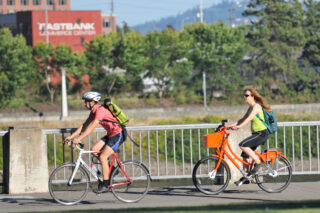
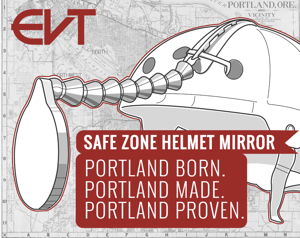
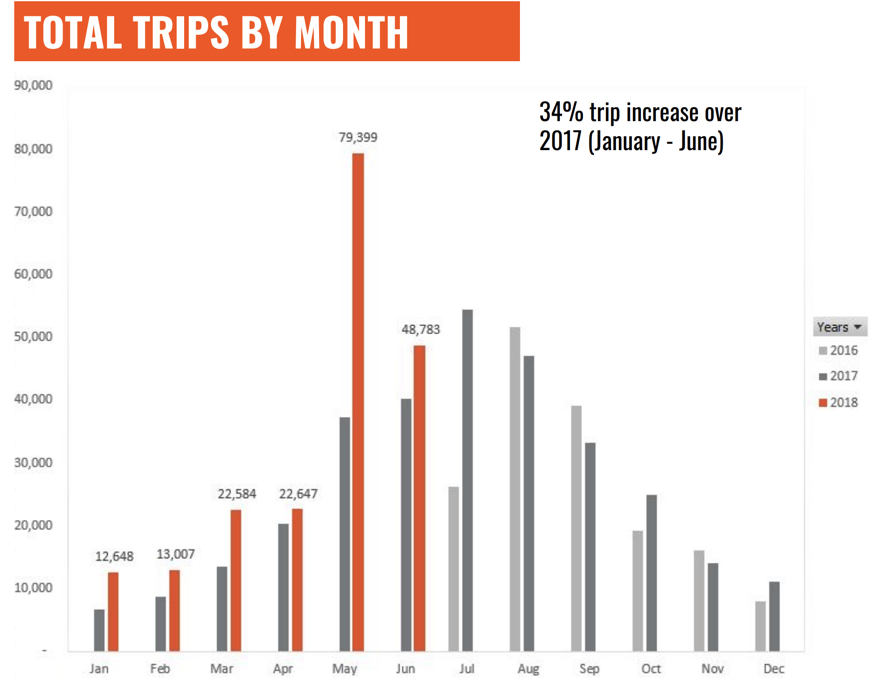
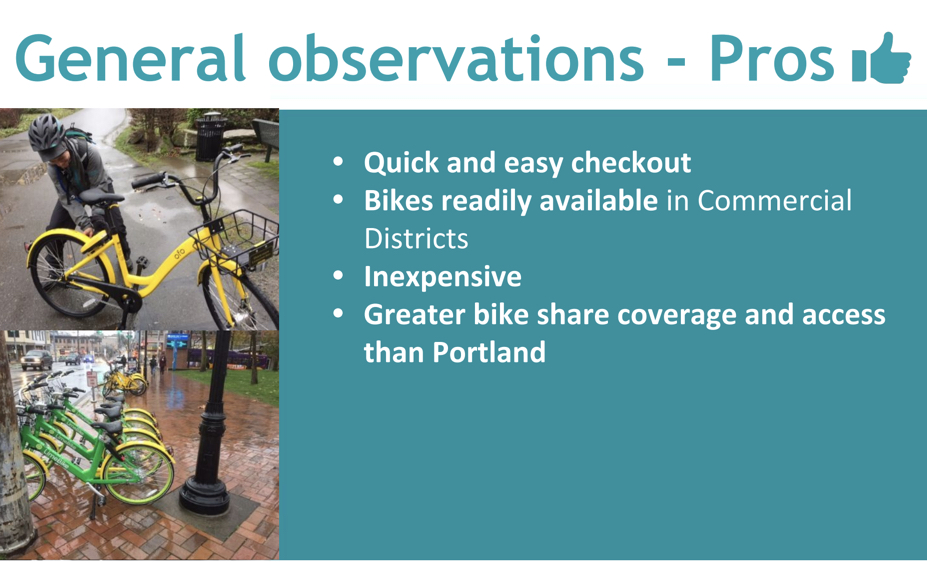
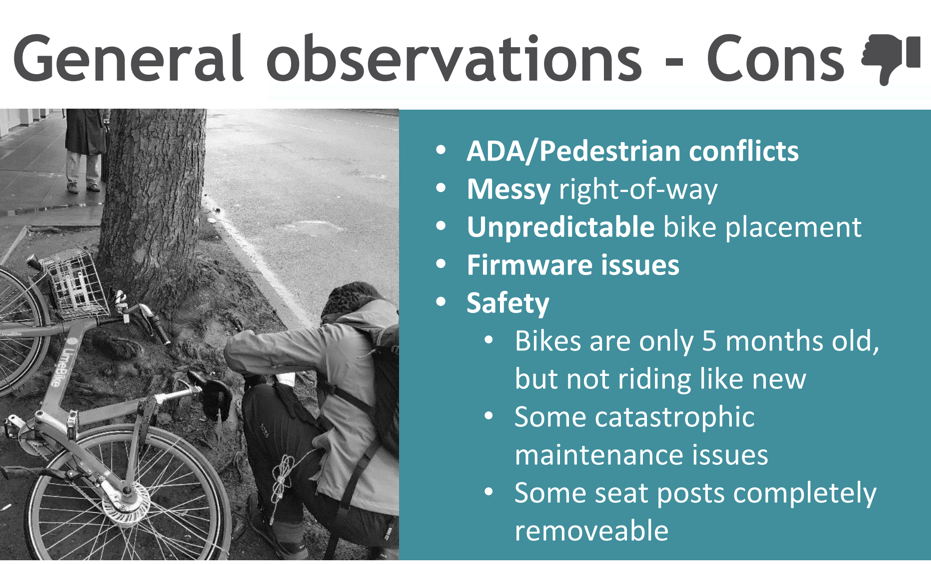

No comments:
Post a Comment